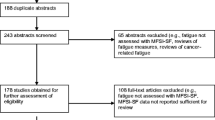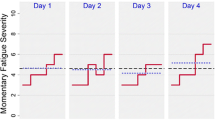Abstract
Background: Understanding how patients with chronic fatigue syndrome (CFS) recall their fatigue is important because fatigue is a core clinical dimension of this poorly understood illness. Purpose: This study assessed the associations between momentary fatigue ratings and weekly recall of fatigue in 71 participants with CFS. Method: During the three-week data collection period, fatigue intensity was recorded six times a day in electronic diaries. At the end of each week, participants were asked to recall their fatigue intensity for that week. Statistical analyses were done with t-tests and Pearson’s and intraclass correlations. Results: Average weekly recall of fatigue intensity was significantly higher than average momentary ratings. Furthermore, moderate to high Pearson’s correlations and intraclass correlations (consistency and absolute agreement) between recall and momentary fatigue ratings were found. Conclusion: Individuals with CFS recalled consistently higher levels of fatigue in comparison to real-time momentary ratings, yet the level of agreement between the two measures was moderate to high. These findings may have implications for the conduct of office examinations for CFS.
Similar content being viewed by others
References
Aaron, L. A., Turner, J. A., Mancl, L., Brister, H., & Sawchuk, C. N. (2005). Electronic diary assessment of pain-related variables: Is reactivity a problem?Journal of Pain, 6, 107–115.
Barsky, A. J., & Borus, J. F. (1999). Functional somatic syndromes.Annals of Internal Medicine, 130, 910–921.
Bolton, J. E. (1999). Accuracy of recall of usually pain intensity in back pain patients.Pain, 83, 533–539.
Cohen, J. (1988).Statistical power for the behavioral sciences. 2nd ed. Hillsdale, NJ: Lawrence Erlbaum.
First, M. B., Spitzer, R. L., Gibbon, M., & Williams, J. B. W. (2001).Structured clinical interview for DSM-IV Axis I disorders (SCID-I). New York: New York State Psychiatric Institute.
Fukuda, K., Straus, S. E., Hickie, I., Sharpe, M. C., Dobbins, J. G., & Komaroff, A. (1994). The chronic fatigue syndrome: A comprehensive approach to its definition and study. International Chronic Fatigue Syndrome Study Group.Annals of Interntal Medicine, 121, 953–959.
Jason, L. A., Richman, J. A., Rademaker, A. W., Jordan, K. M., Plioplys, A. V., & Taylor, R. R., et al. (1999). A community- based study of chronic fatigue syndrome.Archives of Internal Medicine, 159, 2129–2137.
Lefebvre, J. C., & Keefe, F. J. (2002). Memory for pain: The relationship of pain catastrophizing to the recall of daily rheumatoid arthritis pain.Clinical Journal of Pain, 18, 56–63.
McGonagle, K. A., Kessler, R. C., & Schilling, E. A. (1992). The frequency and determinants of marital disagreements in a community sample.Journal of Social and Personal Relationships, 9, 507–524.
Meek, P. M., Lareau, S. C., & Anderson, D. (2001). Memory for symptoms in COPD patients: How accurate are their reports?European Respiratory Journal, 18, 474–481.
Parkinson, B., Briner, R. B., Reynolds, S., & Totterdell, P. (1995). Time frames for mood: Relations between momentary and generalized ratings of affect.Personality and Social Psychology Bulletin, 21, 331–339.
Petrie, K., Moss-Morris, R., & Weinman, J. (1995). The impact of catastrophic beliefs on functioning in chronic fatigue syndrome.Journal of Psychosomatic Research, 39, 31–37.
Reeves, W C, Lloyd, A., Vernon, S. D., Klimas, N., Jason, L. A., Bleijenberg, G., et al. (2003). International Chronic Fatigue Syndrome Study Group. Identification of ambiguities in the 1994 chronic fatigue syndrome research case definition and recommendations for resolution.BMC Health Services Research, 3, 25–35.
Shorter, E. (1992).From paralysis to fatigue: A history of psychosomatic illness in the modern era. New York: Free Press.
Stone, A. A., Broderick, J. E., Porter, L. S., Krupp, L., Gnys, M., Paty, J. A., et al. (1994). Fatigue and mood in chronic fatigue syndrome patients: Results of a momentary assessment protocol examining fatigue and mood levels and diurnal patterns.Annals of Behavioral Medicine, 16, 228–234.
Stone, A. A., Broderick, J., Shiffman, S., & Schwartz, J. (2004). Understanding recall of weekly pain from a momentary assessment perpective. Absolute accuracy, between- and within- person consistency, and judged change in weekly pain.Pain, 107, 61–69.
Stone, A., & Shiffman, S. (1994). Ecological momentary assessment (EMA) in behavioral medicine.Annals of Behavioral Medicine, 16, 199–202.
Stone, A. A., & Shiffman S. (2002). Capturing momentary, self-report data: A proposal for reporting guidelines.Annals of Behavioral Medicine, 24, 236–243.
Surawy, C., Hackman, A., Hawton, K., & Sharpe, M. (1995). Chronic fatigue syndrome: A cognitive approach.Behavior Research and Therapy, 33, 534–544.
Thomas, D. L., & Diener, E. (1990). Memory accuracy in the recall of emotions.Journal of Personality and Social Psychology, 59, 291–297.
Wood, C., Magnello, M. E., & Sharpe, M. C. (1992). Fluctuations in perceived energy and mood among patients with chronic fatigue syndrome.Journal of the Royal Society of Medicine, 85, 195–198.
Author information
Authors and Affiliations
Corresponding author
Additional information
This study was supported by supported by NIH grants MH01961-02 and MO1RR10710.
Rights and permissions
About this article
Cite this article
Friedberg, F., Sohl, S.J. Memory for fatigue in chronic fatigue syndrome: The relation between weekly recall and momentary ratings. Int. J. Behav. Med. 15, 29–33 (2008). https://doi.org/10.1007/BF03003071
Issue Date:
DOI: https://doi.org/10.1007/BF03003071




